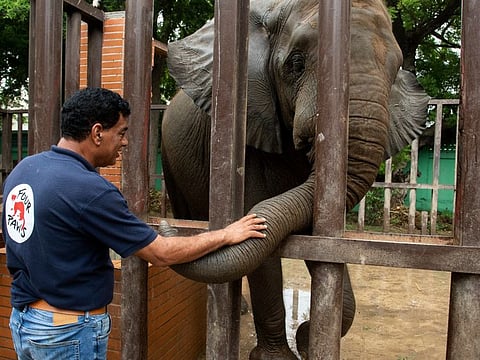Second elephant operated on for dental issues in Pakistan
Vets suggest moving Karachi Zoo’s elephants to Safari Park

Islamabad: A day after treating elephant Madhubala’s chronic tusk infection at Karachi Zoo, the international team of vets representing Four Paws operated upon her younger sister Noor Jehan.
16-year old Noor Jehan’s dental treatment, however, turned out to be less challenging with fewer complications and lasted for 3 hours 40 minutes.
Madhubala’s surgery had lasted 5 hours 40 minutes.
The team operated on the right tusk of Noor Jehan, cut and flattened the tusk and removed the inflamed tissue.
She too was in pain due to infected cavity and according to the team of vets, her tusk was 21cm long.
The surrounding tissue was severely infected, but the tusk was not as rotten as the tusk from Madhubala.
Pain killers, antibiotics given
Like Madhubala, Noor Jehan received pain killers, antibiotics, and vaccinations.
The left tusk was looking fine, said Dr Amir Khalil, head of the Four Paws mission adding the team didn’t find any inflammations, but a small tumor which was removed, and samples were sent to the laboratory.
“Now the wound will need daily flushing, which the local animal keepers will do twice a day in their daily routine,” he said.
Post-operation reunion
Dr Amir Khalil said Noor Jehan was doing well after the operation, adding “She has already eaten and is reunited with her sister Madhubala.”
I am happy to see both the elephants were doing well. It took us over three hours this time but the infection was still severe, said Dr Amir.
Worms, maggots found in tusk
According to another member of the team, Dr Thomas Bernd Hildebrandt, Noor Jehan’s tusk root too was infested with worms and maggots.
“The worms were 23 centimetres inside her head. We removed a tumour and a lot of dead tissues,” said Dr Thomas who heads the Department of Reproduction Management at Leibniz Institute for Zoo and Wildlife Research.
It would have affected her eyes and the brain, if left untreated.
He emphasised the need for post-surgery care for which the local zoo staff needed training.
Vets suggest shifting of elephants to Safari Park
The experts team also visited Safari Park and saw Noor Jehan and Madhubala’s two sisters Malika and Sonia who were in better and greener environment as compared with the Karachi Zoo that is always echoing with the noise from traffic.
They suggested that the elephants, once rehabilitated, should be united with Malika and Sonia, as all of them were from the same family and about the same age.
An interesting fact that Prof Thomas shared was that absence of male partner didn’t matter much as elephants usually adapt themselves to a matriarch-led herd.
Even then it was important that their husbandry issue could be addressed as the four animals are in their prime breeding age.
Dr Hildebrandt pointed out that artificial insemination could be an option (as there was no male member in the group) for which the animal welfare group could provide technical support to the local staff.
This, however, could only work when animals are provided with friendly surroundings, he said.
Artificial insemination, he said, was not new or rare and a large number of zoos were using that method to raise the number of their herds.
The four female elephants were caught from the wild in Tanzania and brought to Karachi in 2009.
Sign up for the Daily Briefing
Get the latest news and updates straight to your inbox



